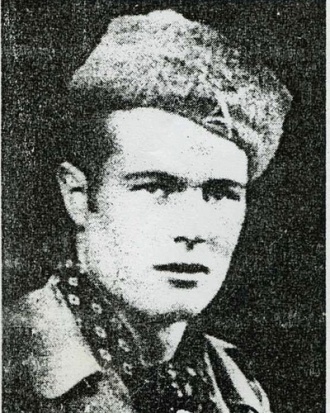This is the last article you can read this month
You can read more article this month
You can read more articles this month
Sorry your limit is up for this month
Reset on:
Please help support the Morning Star by subscribing here
THE global rise of the far right and the 80th anniversary of the end of the Spanish civil war make The Young’uns’ fifth album as pertinent as it could be.

Described as “modern folk theatre,” it’s a song cycle about a real working-class hero from the trio’s hometown of Stockton-on-Tees.
The Ballad of Johnny Longstaff follows him through the 1930s as he begs for bread, goes on hunger marches and takes up arms against Franco.
The trio, named best group in the BBC Radio 2 Folk Awards in 2015 and 2016, were first introduced to Longstaff’s “adventurous life motivated by socialist ideals” by his son Duncan at a gig in 2015, explains Sean Cooney, the band’s main songwriter alongside David Eagle and Michael Hughes.
“He presented me with a picture of his dad and a sheet of paper detailing the things he had done. It was an extraordinary list of achievements that read like a check-list of the most defining moments of working-class and anti-fascist struggle in the 1930s.”
They first wrote about him on Cable Street on their 2017 album Strangers, a collection of songs that celebrate inspirational people. But from the moment Cooney listened to the testimony Longstaff recorded for the Imperial War Museum in 1986, he knew he wanted “to write a whole suite of songs chronicling Johnny’s journey to Spain and back.”
The 17-song cycle, which ends when Longstaff is still just 19, is “political and tragic.” It’s nonetheless peppered with the sort of humour that will be familiar to fans of latter-day Chumbawamba — Paella is “about how he refused to eat the first meal he was given in Spain because it had fish eyes in it!”
Yet despite covering a remarkable breadth of emotions and subjects, the process of selecting material for each song was painless. “The chronology of Johnny’s early life is mapped out fairly straightforwardly in his oral recordings and [unpublished] memoirs and so the order of the songs came quite easily,” says Cooney.
“Quite early on I knew that our collection of songs would be focused on the Spanish civil war and what compelled a teenager from the north of England to fight in a foreign land.”
Cooney also knew from the formative stages of the project that the album would feature Johnny’s own voice in the spirit of the BBC Radio Ballads programmes of the 1950s and 1960s that wove original songs around oral testimonies.
It was pretty difficult to choose the excerpts and required a lot of cutting, pasting and editing, Cooney explains. “As Duncan had warned us, his dad ‘did go on a bit’ and often jumped from one subject to the next without warning.”
These clips are heard most affectingly on the album’s closing track, a version of The Valley of Jarama that breaks into Longstaff’s impassioned delivery. “To hear Johnny suddenly and unexpectedly sing at the end of six hours of oral testimony was a very moving listening experience,” Cooney says.
“His voice cracks with emotion in the final verse as he laments his fallen comrades.”
The album also evokes the period by setting new lyrics to three songs — John Brown’s Body, The Internationale and ¡Ay Carmela! — that would have been familiar to Longstaff. It’s a repurposing that bridges the historical gap and makes his story relevant for a whole new generation.
“He became determined to fight for equality when he witnessed first-hand the huge gap between rich and poor whilst sleeping rough in 1930s London,” observes Cooney. “He became an anti-fascist because he met Jewish refugees from nazi Germany and was filled with horror at the stories they told him.
“For a 17-year-old to be so determined in order to enact change in the world he saw around him inspires us to do the same today.”
The Ballad of Johnny Longstaff premieres at Hull University on January 28 and then tours until February 9, details: theyounguns.co.uk/johnnylongstaff.










